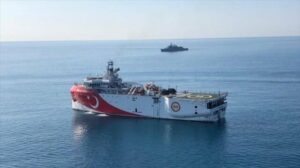The Turkish research vessel Oruc Reis is set to embark on an important mission this Saturday, departing from Istanbul to explore hydrocarbon deposits along the coast of Somalia. This significant journey will mark a key step in Turkey’s ongoing efforts to expand its influence in the region’s energy sector.
Ceremony in Istanbul
The departure ceremony for the Oruc Reis will take place as the ship sails through the iconic Bosphorus Strait, with Turkish President Recep Tayyip Erdogan in attendance. This event underscores the importance of the mission, both for Turkey’s energy ambitions and its geopolitical strategy.
Seven-Month Exploration Mission
Once it reaches the coast of Somalia, the Oruc Reis is expected to remain in the area for seven months. During this period, the vessel will conduct extensive 3D seismic studies to gather crucial data on both gas and oil reserves. The information collected will be analyzed back in Ankara, with plans to initiate drilling activities at select locations based on the findings.
Collaboration with Turkish Petroleum
Somalia has granted an exploration license to Turkish Petroleum, allowing the company to operate within a vast 15,000 square kilometers of sea space. This partnership represents a strategic collaboration between the two nations and a significant investment in Somalia’s potential energy resources.
A Fleet in Support
Accompanying the Oruc Reis on this journey are three escort vessels: Zaganos Pasa, Sancar, and Ataman. The mission will also receive protection from the Turkish Somali Naval Task Force, which includes the ships TCG Gediz, TCG Gokova, and TCG Arif Ekmekci. This show of naval strength aims to ensure the safety of the research team as they operate in the potentially volatile waters of the region.
Opposition Concerns
However, the mission has not been without its controversies. Yanki Baggiyoglu, the vice president and defense minister of the opposition Republican People’s Party (CHP), voiced strong objections to the dispatch of warships to escort the Oruc Reis. He argues that amid existing security threats in the region, diverting naval combat resources away from Turkey is a strategic mistake that could compromise national security.
Ask me anything
Explore related questions





